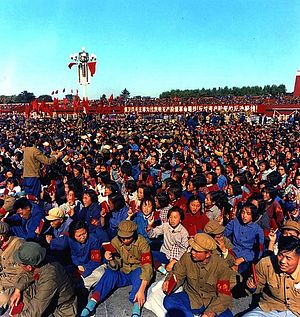Not enough can be said about the insidious and pervasive power of China’s National Intelligence Law, which came into effect in July 2017.
This may be one of the reasons that Communist Party legal authorities are attempting to defend the law in the international media. Dr. Gu Bin, of the Beijing Foreign Studies University, writes in his opinion piece in the Financial Times that “Western fears of party influence on Chinese companies are overblown.”
Gu attempts to reassure the world that China’s National Intelligence Law, “in particular Article 7,” is “often misunderstood.” But amid rising concerns about the long and deep reach of the Chinese Communist Party (CCP) into Chinese telecommunications and other Chinese-owned and operated companies around the world, Gu may have inadvertently encouraged readers to arrive at exactly the opposite conclusion.
Article 7 of the law, Gu writes, creates the “obligation of Chinese citizens to support national intelligence work.” However, “it does not authorize pre-emptive spying; national intelligence work must be defensive in nature.”
Thus, in so many words, a leading CCP law professor acknowledges that the law does indeed oblige citizens to spy on one another — the only question is at what point in the process the spying can legally begin.
Dr. Murray Scot Tanner also disagrees with the characterization of the law as merely a “defensive” measure. Writing in Lawfare shortly after the law came into effect, Tanner lays out the case that the National Intelligence Law is designed to turn a Chinese citizen’s “legal obligations from intelligence ‘defense’ to ‘offense’…”
He writes,
The Intelligence Law… repeatedly obliges individuals, organizations, and institutions to assist Public Security and State Security officials in carrying out a wide array of “intelligence” work. Article Seven stipulates that “any organization or citizen shall support, assist, and cooperate with state intelligence work according to law.”
Article 14, in turn, grants intelligence agencies authority to insist on this support: “state intelligence work organs, when legally carrying forth intelligence work, may demand that concerned organs, organizations, or citizens provide needed support, assistance, and cooperation.”
When discussing the implications of such a law in China, historical context should not be forgotten or ignored. Chinese citizens have been encouraged and even coerced to inform on each other in the recent past – with devastating results.
In 1966, Mao Zedong launched the Cultural Revolution, which “lighted the flames…to purge his opponents and preserve the ‘true’ communist ideology,” wrote Dr. Zhou Zehao in 2016. Marking the 50-year anniversary of the beginning of the movement that would effectively erase Chinese culture from the People’s Republic of China, and in the process kill, starve, maim, and dehumanize millions, Zhou poignantly describes his and his family’s suffering at the hands of the Red Guards who terrorized the nation, all the while exhorted and encouraged to do so by Mao.
But how did the Red Guards, who were effectively the field operations and enforcers of the Cultural Revolution, know whom to target? The Red Guards were the youth of China, not the older, seasoned Party elite with access to personal files of everyday Chinese citizens.
As Zhou describes, the Red Guards went from neighborhood to neighborhood, and house to house, torturing and killing along the way.
But they were selective. In Zhou’s home, his sister was earmarked as a “capitalist roader” because she was a school principal. His father was also guilty of crimes against the state for having worked with the American Flying Tigers during World War II.
The Red Guards knew these things about specific individuals because neighbors, work colleagues, and often other family members had spied and informed on them. Under Mao’s leadership, it was not necessary to incorporate the “obligation” of citizens to spy on one another into smoothly codified legal terms.
Fast forward five decades, and China has acquiesced to more formal measures of dictate. Written measures now define the Chinese state, and its relationship to its people.
Xi Jinping is often heralded as the most powerful Chinese leader since Mao. Certainly, no leader since Mao has more adamantly called for a return to fundamental communist principles, practices, and persuasions.
Mao was able to induce the Chinese population to spy and inform on itself with just a few spoken words, unleashing apocalyptic mayhem, murder, and destruction. Xi has used legislation and regulations to place a similar obligation upon not only Chinese citizens, but also upon companies and other entities, as well.
It appears that the lessons of the Cultural Revolution have not been entirely absorbed by today’s leadership, many of whom were themselves on one side or the other of the turmoil and violence.
It can be argued that whether or not the law is for defensive purposes, as Gu argues, or for offensive purposes, as Tanner suggests, the legal obligation for Chinese to act as citizen spies in the name of national security poses a greater risk for Chinese society than the danger the law is attempting to minimize, given history and tendencies.

































